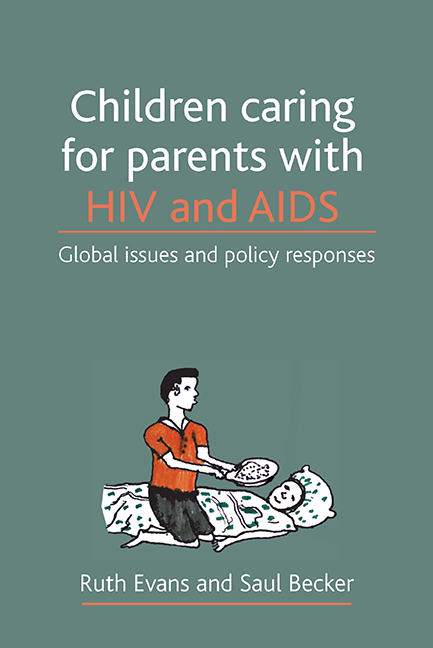Book contents
- Frontmatter
- Dedication
- Contents
- List of tables, figures and boxes
- Preface
- one Children’s and young people’s caring responsibilities within the family
- two HIV and the family
- three Reflexivity, methodology and ethics: the research process
- four Living with HIV and the effects on family life: parents’ narratives
- five Children’s and young people’s care work in households affected by HIV and AIDS
- six Resilience and impacts of care work for individual young people and their families
- seven Resilience and impacts of young people’s care work within the school and wider community
- eight The role of formal safety nets in building children’s and families’ resilience
- nine Global and local processes influencing young people’s caring roles in families affected by HIV and AIDS
- ten Responding to the support needs of children and young people caring for parents with HIV
- Bibliography
- Index
three - Reflexivity, methodology and ethics: the research process
Published online by Cambridge University Press: 21 January 2022
- Frontmatter
- Dedication
- Contents
- List of tables, figures and boxes
- Preface
- one Children’s and young people’s caring responsibilities within the family
- two HIV and the family
- three Reflexivity, methodology and ethics: the research process
- four Living with HIV and the effects on family life: parents’ narratives
- five Children’s and young people’s care work in households affected by HIV and AIDS
- six Resilience and impacts of care work for individual young people and their families
- seven Resilience and impacts of young people’s care work within the school and wider community
- eight The role of formal safety nets in building children’s and families’ resilience
- nine Global and local processes influencing young people’s caring roles in families affected by HIV and AIDS
- ten Responding to the support needs of children and young people caring for parents with HIV
- Bibliography
- Index
Summary
This book draws on qualitative research conducted for a comparative study that aimed to explore the similarities and differences in the experiences, needs and resilience of children and young people who cared for parents/relatives with HIV/AIDS in Tanzania and the UK. The key objectives of the study were to, firstly, compare and contrast the structural and relational factors which influence whether and why children become carers in Tanzania and the UK; second, to develop an understanding of the experiences, needs and resilience of children caring for parents/relatives with HIV/AIDS in Tanzania and the UK; and third, to begin to identify the policy and practice implications of young carers’ experiences, resilience and needs for health, social care, education, voluntary and community sectors in Tanzania and the UK. This chapter provides a reflexive account of the research process. It discusses the research methodology and reflects on the stance of the authors and their approach to the research topic. The chapter describes the process of gaining access to families and negotiating informed consent to participate in the study as well as researcher/researched relations. The chapter then highlights some of the ethical issues raised by cross-cultural research and interviewing respondents about sensitive topics, including the importance of confidentiality and anonymity and the need to manage respondents’ expectations. Finally, the chapter describes the main characteristics of interviewees and the locations for the research, as well as the approach to data analysis and dissemination.
Research with children and the ‘new social studies of childhood’
The empirical study of children in Europe and North America over the last 150 years has largely been regarded as the domain of psychology, which positioned children as passive objects of study to be ‘scrutinized, tested and measured’ (Alldred, 1998: 150). As Quortrup comments, this constructs children as more like ‘human becomings’ than human beings (Quortrup, 1987, cited in Alldred, 1998: 150) and denies children's agency. In contrast, the ‘new social studies of childhood’, which developed from the 1970s onwards, acknowledges that children are not just passive recipients of social structures and processes (James and Prout, 1997), but rather are social actors who actively shape their environments and social worlds.
- Type
- Chapter
- Information
- Children Caring for Parents with HIV and AIDSGlobal Issues and Policy Responses, pp. 67 - 90Publisher: Bristol University PressPrint publication year: 2009



